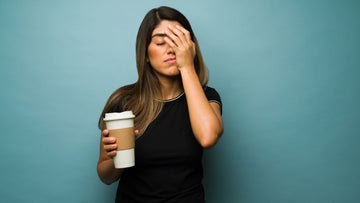The Link Between Caffeine, Hormones, and Your Monthly Cycle
presso Sila Gatti su Aug 13, 2025

Most of us know caffeine can cause jitters, racing heartbeats, or restless sleep — but did you know its effects aren’t the same every day of the month? For women, your hormones play a huge role in how your body responds to caffeine.
Let’s break down what’s happening — and how you can work with your body, instead of against it.
How Caffeine Works
Caffeine is a stimulant that blocks adenosine (the chemical that makes you feel sleepy) and increases adrenaline and cortisol — your “fight or flight” stress hormones. This gives you a short-lived boost in focus and energy, but it also puts more stress on your nervous system.
When your hormones are steady, your body may tolerate this well. But during certain phases of your cycle, caffeine’s effects are amplified — often in ways you don’t want.
Your Cycle, Your Coffee Tolerance
Your menstrual cycle has four main phases — and your caffeine tolerance can shift in each:
1️⃣ Menstrual Phase (Days 1–5) – Hormones are at their lowest. You may crave comfort, warmth, and stable energy. Coffee can give a quick lift, but it may also feel harsher on digestion during this time.
2️⃣ Follicular Phase (Days 6–14) – Estrogen rises. You may feel more energised and able to tolerate caffeine better. This is often the phase where women can enjoy coffee with fewer side effects.
3️⃣ Ovulation (Around Day 14) – Estrogen peaks, and testosterone gets a boost too. Caffeine might make you feel extra sharp — but it can also increase anxiety if you’re already sensitive.
4️⃣ Luteal Phase (Days 15–28) – Progesterone rises to prepare your body for a possible pregnancy. You might feel more tired, bloated, or irritable. Caffeine can worsen PMS symptoms, disrupt sleep, and spike cravings.
Why Caffeine Can Feel Worse Before Your Period
In the late luteal phase, your body is more sensitive to cortisol spikes. Because caffeine raises cortisol, it can leave you feeling wired, anxious, and even more fatigued once the crash hits.
This is also when blood sugar can be more unstable — and caffeine can make that worse.
Caffeine and Hormonal Health
Long-term, too much caffeine can:
-
Disrupt ovulation in sensitive women【1】
-
Increase PMS and PMDD symptoms【2】
-
Interfere with thyroid and adrenal function【3】
-
Affect fertility by altering estrogen and progesterone balance【4】
This doesn’t mean you have to give up coffee forever — but it does mean knowing when and how much to drink can make a big difference.
How to Cycle Your Caffeine Intake
💡 Try caffeine-free weeks — especially during the luteal phase or if you have PMS/PMDD.
💡 Swap to gentler drinks like herbal teas or caffeine-free coffee alternatives (hello, Not Coffee).
💡 Don’t drink caffeine on an empty stomach — it spikes cortisol even more.
Your Ritual, Without the Hormonal Rollercoaster
If you love the taste and comfort of coffee but your hormones (or your sleep, mood, or gut) aren’t loving it back, Not Coffee was made for you.
Not Coffee Now – Our instant, caffeine-free coffee alternative made from roasted chicory root and organic carob. It works like instant coffee, tastes smooth and rich, and is gentle on your hormones, digestion, and nervous system.
Your cycle is unique — your cup should be too.
References:
-
Chavarro, J.E., et al. (2009). Caffeinated and alcoholic beverage intake in relation to ovulatory disorder infertility. Epidemiology, 20(3), 374–381.
-
Rossignol, A.M. (1998). Caffeine-containing beverages and premenstrual syndrome in young women. American Journal of Public Health, 78(10), 1335–1339.
-
Lovallo, W.R., et al. (2005). Cortisol responses to caffeine are related to habitual caffeine intake. Psychosomatic Medicine, 67(5), 734–739.
-
Fenster, L., et al. (1999). Caffeine consumption and menstrual function. American Journal of Epidemiology, 149(6), 550–557.





